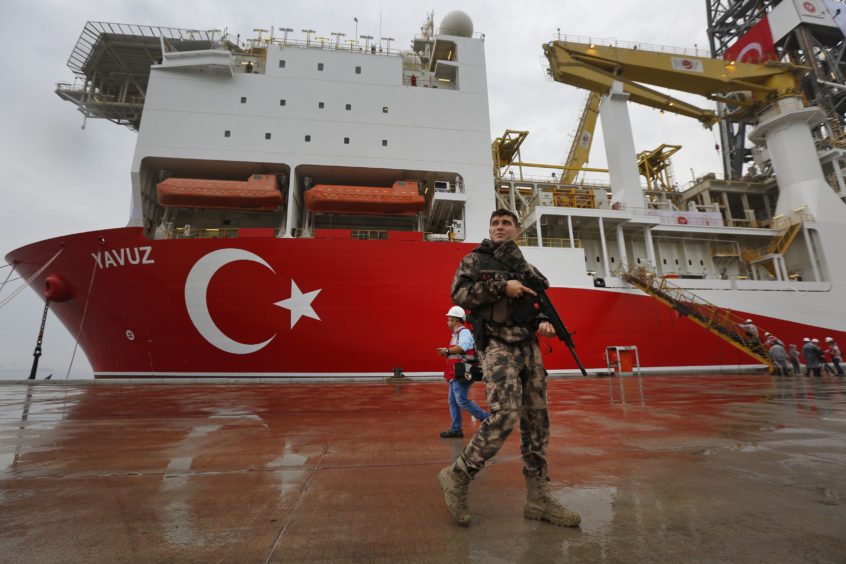
The search for natural gas off Cyprus is accelerating, with several companies due to drill new wells to confirm recent discoveries, test prospects and develop known resources.
Cypriot Energy Minister Yiorgos Lakkotrypis recently announced that work on eight wells – six exploratory and two appraisal – would begin later this year.
ExxonMobil and its partner Qatar Petroleum International (QPI) will be looking to follow up their success at the Glaucus-1 well in Block 10 in February, which could hold up to 8 tcf (227 bcm) of gas.
Elsewhere, France’s Total and Italy’s Eni will together expedite their search for new gas reserves, with Noble Energy also in the mix for what is shaping up to be a busy 2020.
Lakkotrypis also announced that the renegotiation of the production-sharing contract (PSC) for the Aphrodite field with Noble and its partners Royal Dutch Shell and Delek Drilling had concluded.
The conclusion of the talks paves the way for the development of the field, which contains an estimated 4.5 tcf (127 bcm) of gas.
Once lifted, gas from Aphrodite will be transported by a subsea pipeline to the Shell-operated LNG terminal at Idku in Egypt for re-export.
The minister said the project would earn over US$9 billion for Cyprus over an 18-year period, with first LNG exports anticipated in 2024-25.
Ankara’s anger
These developments have prompted Turkey to expand its own exploration efforts in Cyprus’ exclusive economic zone (EEZ).
Turkey claims a significant portion of the western Cypriot EEZ as part of its continental shelf.
Ankara also considers itself the protector of the interests of the Turkish-Cypriot community that resides in the northern Turkish-occupied side of the island.
For its part, the Turkish-Cypriot administration claims a huge portion of the Cyprus EEZ is under its jurisdiction and has awarded the entire area to state-owned Turkish Petroleum (TPAO).
Turkey has negligible domestic oil and gas output and so covets the resources being discovered offshore Cyprus.
The country has sent its seismic survey vessel into southern Cypriot waters on numerous occasions and in February 2018 Turkish warships blocked the Saipem 12000 drillship from reaching a drill site in the Eni-operated Block 3, southeast of the island.
This followed Eni’s discovery of gas in the Calypso well in Block 6 just weeks earlier.
Turkey’s own drillship, the Fatih, has since moved into the East Mediterranean. It took up a position some 80 km west of the island’s Akamas Peninsula, within the Cyprus EEZ, in May this year.
Nicosia responded by gathering diplomatic support from its fellow EU members and from the US, UN, Israel and Egypt.
It also issued arrest warrants for the Fatih’s crew members and executives of two US and Croatian companies contracted by TPAO.
A Cypriot official also recently told reporters off the record that Nicosia would sue any company that participates in Turkey’s efforts to drill in the Cyprus EEZ.
The Turkish government responded to news of the warrants by saying it would reciprocate.
On June 14 Turkish Foreign Minister Mevlut Casuvoglu said the Fatih, which has been idle since May, had started drilling. If this proves to be true, tensions in the East Mediterranean could ratchet up a notch.
Cavusoglu told Turkey’s Anadolu news agency: “We used to do seismic exploration because we didn’t have a drilling vessel. Now our Fatih 1 started drilling to the west of Cyprus.”
It was not clear if ‘Fatih 1’ referred to the vessel or a well number.
Turkey said any deals done by Cyprus (such as the agreement to develop Aphrodite and export gas to Egypt) were “invalid.”
Turkey has now sent a second drillship, Yavuz, into the contested area.
Cypriot support
Turkey maintains its rights in the East Mediterranean extend as far south as the Egyptian EEZ and in May it held a large naval exercise in the region as a show of force.
In response, Cyprus has continued to drum up international support for its energy programme.
During a summit of southern EU countries in Malta on June 14, the leaders of France, Spain, Portugal, Italy and Greece told Cypriot President Nicosia Anastasiades that Cyprus had their full support.
French President Emmanuel Macron said during the summit: “Turkey must stop its illegal activities in the EEZ of Cyprus. The EU will not show any weakness on this subject.”
Greece, which has its own maritime border issues with Turkey, also repeated its warnings to Ankara over its actions.
Greek Prime Minister Alexis Tsipras said: “It’s important to signal that the EU should take specific measures if Turkey does not stop its infringing behaviour.
“Whoever doesn’t respect international law must suffer the consequences.”
Turkey has yet to heed the repeated cautionary advice from Europe and further afield, however.
Its application for EU membership is on hold and Ankara is also on the verge of a serious difference with the US over its plan to accept delivery of Russian S-400 missiles.
This could see Turkey, which is a NATO member, ejected from the US F-35 fighter jet programme and hit by other US sanctions.
It is another sign of the growing tensions in the region, which will only be exacerbated if more gas is discovered in Cyprus’ EEZ in 2020.